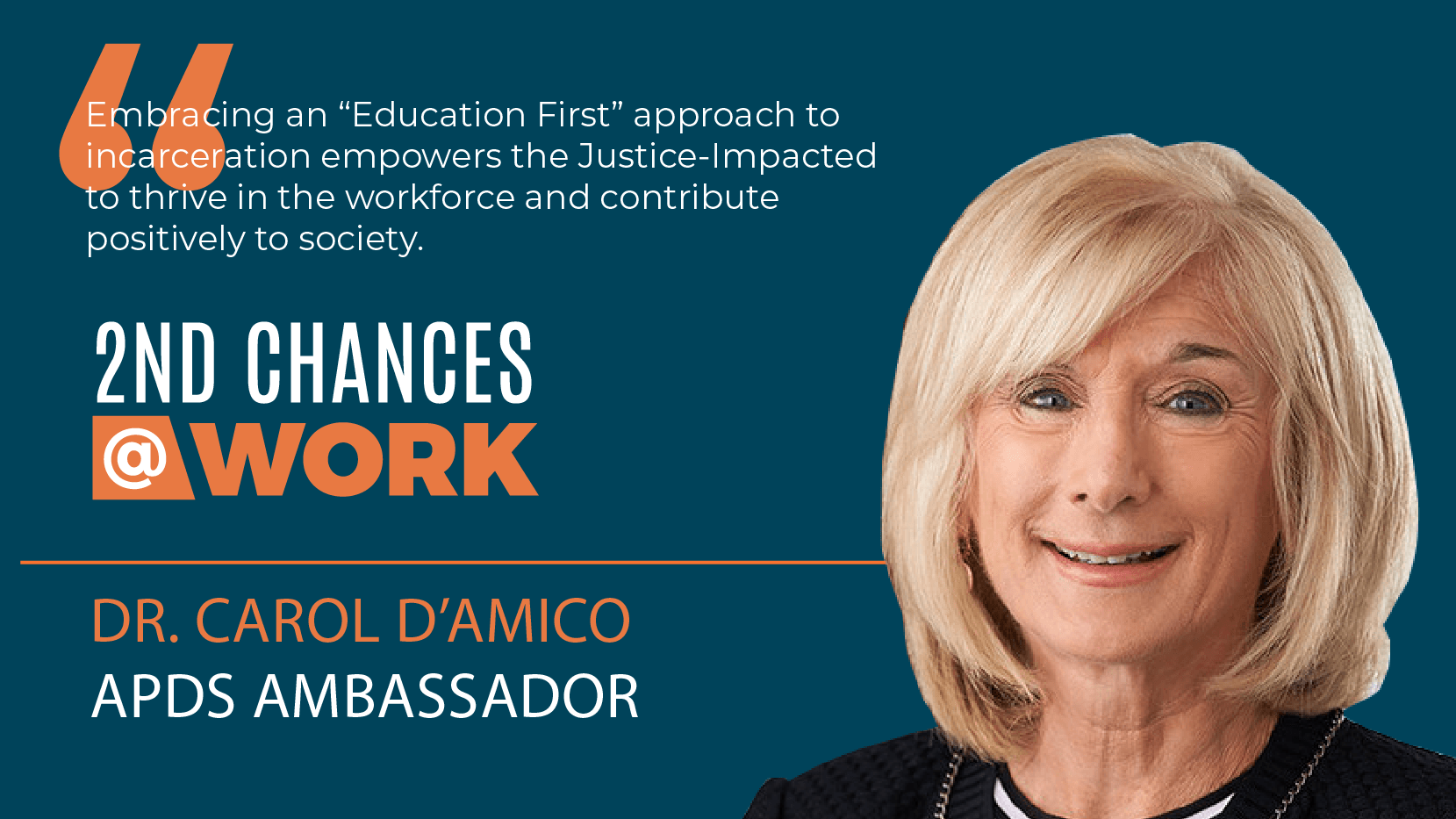“Embracing an “Education First” approach to incarceration empowers the Justice-Impacted to thrive in the workforce and contribute positively to society.
Education gives the 600,000 people released from correctional facilities each year a second chance.”
In corrections reform, integrating education and workforce initiatives is pivotal to the successful reentry of previously incarcerated individuals, and it makes economic sense. As an education and workforce board advocate for corrections reform, I have witnessed the transformative power of second chances at work. In this blog post, I share my perspective on the importance of educational opportunities, workforce training, and supportive environments in empowering individuals seeking to rebuild their lives. By embracing second chances, we can foster personal growth, build self-esteem to pave the way for long-term success and significantly impact the economy.
Financial Independence Through Education
Education is not just a powerful catalyst for personal transformation but financial independence too. By offering educational opportunities to individuals with a history in the criminal justice system, we provide them with the tools to develop new skills, expand their knowledge base, and unlock their potential. Education equips individuals with the foundation for meaningful employment, leading to increased economic productivity and growth.
Unfortunately, three-quarters of frequently arrested incarcerated individuals do not have a high school diploma or equivalency. Due to the failure to meet education levels, The unemployment rate for formerly incarcerated people is nearly five times higher than the unemployment rate for the general United States population. This further perpetuates the cycle of poverty and increases the likelihood of re-offending. Not only does their lack of education create barriers to employment, but it also harms their overall well-being and ability to reintegrate. Moreover, a lack of education often perpetuates a cycle of incarceration and poverty. Nearly half of all individuals who are incarcerated multiple times earn less than $10,000 annually, which is well below the poverty line. Investing in education can break this cycle and create a more prosperous society.

Reducing Recidivism as a Catalyst for Economic Stability
Investing in education for previously incarcerated individuals is a smart economic decision that benefits society and communities. So how do we reduce recidivism rates? By taking an “Education First” approach to incarceration. Around 600,000 people are released annually from correctional facilities in the United States. However, the reentry system for these individuals is often inadequate, emphasizing surveillance rather than rehabilitation. By embracing education as a means of rehabilitation, we can break down barriers to employment and foster personal growth. Education empowers individuals with the skills and knowledge they need to thrive in the workforce and contribute positively to society. Studies show that there is a 43% reduction in recidivism for those who participate in prison education programs, and numerous studies point to reductions in in-prison violence for those enrolled in educational programs. Furthermore, when individuals have access to education, they are more likely to secure stable and well-paying jobs, reducing the likelihood that they will return to incarceration. This, in turn, reduces the burden on the criminal justice system and saves taxpayers money.
Workforce Training and Skill Development
Equipping individuals with relevant workforce skills is crucial for successful reintegration into society and economic growth. Workforce training programs, tailored to each individual’s needs and career aspirations, offer a practical approach to bridging the skills gap. By providing opportunities for training in high-demand industries, such as technology, healthcare, or skilled trades, we empower those previously incarcerated to become self-sufficient, contribute to their communities, and build fulfilling careers.
APDS offers customized programs that empower incarcerated individuals to acquire the necessary knowledge and skills to seek fulfilling living-wage careers and contribute to their communities. Research has shown that formerly incarcerated individuals in the United States face an unemployment rate of 27%, and poverty is the most significant factor contributing to recidivism.
Individuals who secure employment after incarceration are 61% less likely to reoffend compared to those who remain unemployed. Council on Criminal Justice (2023). Workforce training programs enhance employment prospects, instill confidence, and provide a sense of purpose. Second Chance programs are critical in helping those with a justice-impacted history reintegrate into society, while providing economic benefits successfully.

Investing in Education and Fostering Collaboration Among Workforce Entities.
A society that invests in education for its most underserved is crucial for successful reintegration and second chances at work, ultimately leading to economic growth. Organizations and employers can foster supportive cultures and promote personal growth, accountability, and support by implementing mentorship programs, peer support networks, and comprehensive reentry services. These environments provide guidance, encouragement, and resources to overcome challenges and thrive professionally.
Collaboration between educational and workforce entities is essential in effectively implementing second chances at work. We can align resources, expertise, and best practices by establishing partnerships among corrections and labor departments, and other state agencies and employers. Collaboration enables the development of comprehensive programs that address the unique needs of individuals seeking second chances, including academic support, job placement services, and ongoing mentoring. Working together, we can seamlessly transition from education and training to meaningful employment, ultimately leading to economic growth and prosperity.




